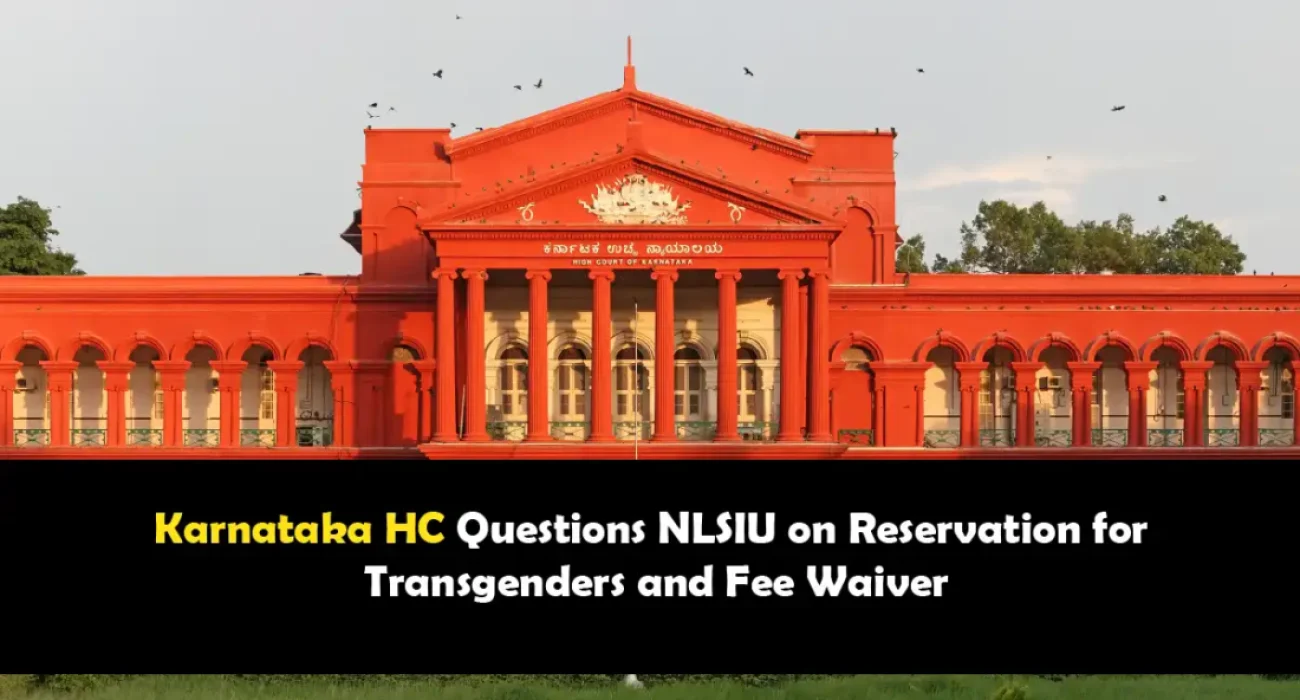

Table of Contents
ToggleThe case stems from a challenge by the National Law School of India University (NLSIU) against a single-judge order of the Karnataka High Court. That order directed the university to provide a 0.5% interim reservation along with a fee waiver for transgender persons applying to its courses, pending implementation of the Supreme Court’s landmark decision in NALSA v. Union of India (2014). The single judge had emphasized that the reservation was necessary due to the university’s failure to implement the NALSA guidelines and further stated that such reservation would not count as excess intake and would be valid only for the current academic year.
A Division Bench comprising Justice V Kameshwar Rao and Justice TM Nadaf heard the university’s appeal. The court posed a pointed question to the university’s counsel, senior advocate KG Raghavan:
“After the single judge’s order and pending outcome of this appeal…did anyone (NLSIU) apply their mind whether in principle we must have this kind of reservation?”
Raghavan responded that the university’s Executive Council, which consists of eminent legal experts, was indeed considering the matter. He clarified that NLSIU was “not against anybody” and acknowledged that the issue was a “social problem”, but also maintained that reservation is a policy issue, not one to be judicially imposed. He argued:
“The council will look at it and take a reasoned, conscious and an objective decision… But can a court direct reservation and fee waiver where Articles 15 and 16 only contemplate it through policy?”
Raghavan further pointed out that even the fee waiver request had not been granted, and questioned whether an interim order could impose a relief (reservation) that could not be granted finally.
“If you cannot grant final relief of reservation then how can you grant interim measure to be adopted?”
The petitioner, appearing in person, contested NLSIU’s claims, asserting that the university had not even properly read the NALSA judgment before forming its position. They insisted that the single judge’s direction was a harmonious reading of the Supreme Court’s ruling, and that the recognition of transgender identity and associated rights are clearly enshrined in NALSA.
The petitioner highlighted that the basis for the 1% transgender reservation in Karnataka’s General Recruitment Rules did not originate from an executive order, but was court-mandated through a prior PIL, thereby justifying judicial intervention even in educational contexts. When asked by the court about the context of the earlier PIL, the petitioner explained that it related to employment but emphasized that “modalities remain the same” for education.
They also challenged the varsity’s approach to admissions, arguing “They (NLSIU) have not submitted what and when they are going to implement. Still, they continue accepting admission applications from TG candidates. That is a violation of Article 14.”
The petitioner further noted that even after the 2023 plea and an interim order, a new round of admissions was conducted in 2024 without implementing any reservation or aid policy. They personally had applied for financial aid, disclosed sensitive personal information, and were initially told to take out a loan instead of being granted aid. Later, the university denied the waiver outright, claiming that “all students must pay”.
When asked by the court whether the financial aid issue was linked directly to transgender identity, the petitioner replied “Absolutely, mylords. It was only in 2014 that transgender persons got some recognition.”
The court orally noted that while NLSIU recognized the petitioner under the “Other” category, a more concrete policy must be in place to advance this recognition into actionable inclusion. The justices appeared concerned that no timeline or mechanism had been proposed by the university to implement the reservation or aid as ordered by the single judge.
The court asked whether the NALSA judgment specifies a particular percentage of reservation, to which the petitioner clarified that while no fixed quota was set, the single judge had used 0.5% as a reasonable interim benchmark, mirroring Karnataka’s transgender employment reservation.
The matter remains pending and is scheduled for further hearing on April 29, 2025.
The single judge had explicitly stated“NLSIU is directed to implement directions issued by Hon’ble Supreme Court in NALSA’s case… by formulating reservation along with measures for providing financial aid to TGs in education before commencement of admission process for next academic year.”
And until such implementation “…to provide a reservation of 0.5% (half the percentage of reservation provided for TGs in employment under State) as interim reservation with fee waiver…”
This was to be done without reducing seats from the general pool, and only for the current academic year. The court also permitted NLSIU to apply for grants from the State or Central Government to support such a policy.
Credits: Adv. Deeksha Rai
IAW resources
Browse our help directory